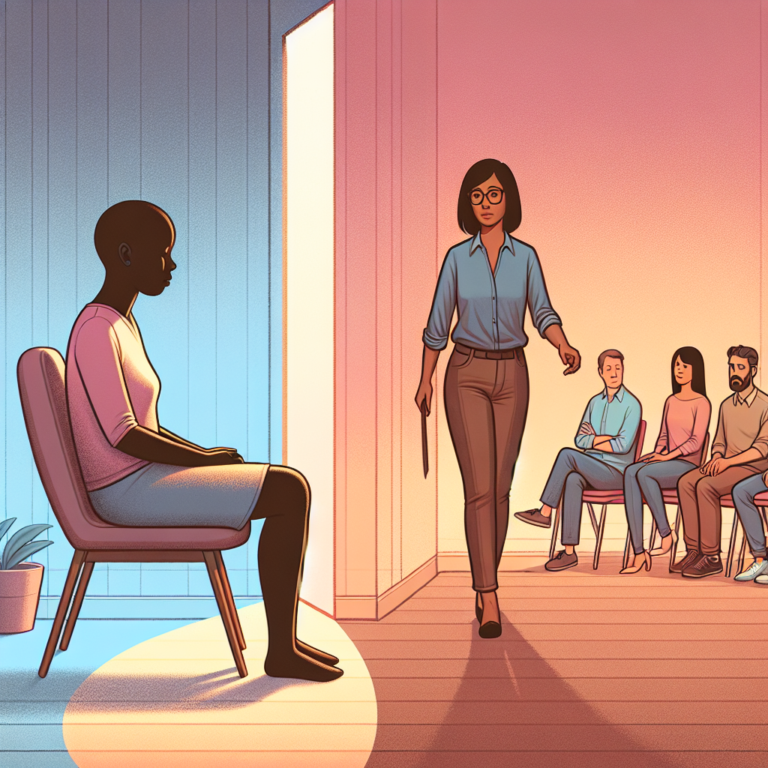
Overcoming Social Anxiety: How Group Therapy Creates Lasting Change
Introduction
Social anxiety is an all-too-common struggle that leaves many feeling isolated and misunderstood. The idea of participating in social interactions can provoke feelings of panic, self-doubt, and crippling fear. Yet, these challenges can be addressed and conquered through effective therapeutic strategies like group therapy. Overcoming Social Anxiety: How Group Therapy Creates Lasting Change is a vital conversation for anyone seeking relief from the shackles of social anxiety. This article explores the transformative power of group therapy in fostering lasting change, providing unique insights, case studies, and actionable tips for those ready to take the leap.
Understanding Social Anxiety
What is Social Anxiety?
Social anxiety disorder (SAD) involves intense fear and avoidance of social situations due to the fear of being judged, embarrassed, or humiliated. It can lead to significant distress and impact daily functioning, relationships, and overall quality of life.
Symptoms of Social Anxiety
- Excessive worry about social interactions
- Rapid heartbeat or sweating in social situations
- Fear of embarrassment or humiliation
- Avoidance of social activities
Understanding these symptoms is crucial in recognizing and addressing social anxiety.
The Power of Group Therapy
What is Group Therapy?
Group therapy combines individuals with similar issues, creating a supportive environment where participants can share their experiences. It typically includes a trained therapist who facilitates discussions and guides activities that promote healing and growth.
How Group Therapy Works
- Peer Support: Participants share their experiences, providing validation and assurance that they are not alone in their struggles.
- Modeling Behavior: Observing others manage similar issues can inspire and empower individuals.
- Skill Development: Group therapy provides a platform to practice social skills in a safe environment, helping individuals build confidence.
The Lasting Changes Achieved Through Group Therapy
Building Confidence
One of the primary outcomes of group therapy is increased self-confidence. Through regular participation, individuals gradually challenge their fears, learn new social skills, and receive constructive feedback.
Case Study: Sarah’s Journey
Sarah, a 28-year-old accountant, struggled with social anxiety for years. After enrolling in a group therapy program, she reported feeling more at ease during social interactions within six sessions. By the end of the program, she had successfully attended family gatherings and even engaged in conversations at networking events, showcasing the lasting change that group therapy can create.
Creating a Support Network
Group therapy fosters connections among participants. This sense of community can be invaluable for those with social anxiety, providing social support outside the therapy sessions.
Case Study: Mark’s Transformation
Mark, a university student, found himself isolated due to social anxiety. By participating in a group therapy program, he built friendships with peers who understood his struggles. This network encouraged him to attend social events. Today, he credits this support system as a crucial element in overcoming social anxiety.
Learning Coping Strategies
Group therapy equips participants with practical coping skills to manage anxiety. Techniques such as mindfulness, cognitive restructuring, and exposure therapy are introduced in a group context, allowing for shared learning and practice.
Case Study: Lisa’s Coping Toolbox
Lisa, a 35-year-old teacher, joined a group therapy for her social anxiety. She learned various coping strategies, including role-playing exercises and mindfulness techniques. Owing to her active participation in the sessions, she felt empowered to face her fears and eventually led a workshop at school, demonstrating the lasting change that group therapy facilitated.
Table: Benefits of Group Therapy for Social Anxiety
| Benefit | Description |
|---|---|
| Peer Support | Shared experiences create a sense of belonging. |
| Increased Confidence | Regular exposure to social situations boosts self-esteem. |
| Skill Development | Participants learn and practice social skills together. |
| Coping Strategies | Acquisition of effective mechanisms to handle anxiety. |
The Role of the Therapist
Facilitation Skills
A group therapist plays a crucial role in guiding discussions, ensuring a safe and respectful environment, and fostering group cohesion. Utilizing techniques like active listening and encouraging participation, therapists help facilitate meaningful interactions among group members.
Tailored Interventions
While group therapy follows a general framework, a skilled therapist will tailor interventions to meet the unique needs of the group, addressing varying levels of social anxiety and adjusting the focus of sessions as necessary.
Overcoming Objections to Group Therapy
Despite the clear benefits, many individuals with social anxiety may hesitate to join group therapy. Addressing these concerns is vital for encouraging participation.
Fear of Judgment
Response: It’s important to recognize that participants are likely to share similar fears and experiences. The group setting is designed to cultivate empathy, making judgment less of a concern.
Self-Stigma
Response: Many individuals fear being labeled or judged for attending therapy. However, acknowledging and discussing this stigma within the group can actually reduce feelings of isolation and promote healing.
Comfort Levels
Response: Participants can often design their own comfort zone through gradual exposure within the therapy setting. Therapists usually employ a step-by-step approach to social interactions, allowing individuals to progress at their own pace.
Actionable Steps for Engaging in Group Therapy
- Research Local Programs: Look for qualified therapists and programs specializing in social anxiety.
- Ask for Recommendations: Sometimes, friends or healthcare providers can recommend reputable therapists or programs.
- Start Small: If jumping into a full group therapy session feels overwhelming, consider beginning with other types of support, such as support groups or workshops.
- Communicate Your Concerns: Be open with your therapist about your fears regarding participation.
Motivational Takeaway
Remember: Every step you take in overcoming social anxiety is a step toward reclaiming your life. The journey may feel daunting, but the support and lasting change that group therapy offers can ignite your path to resilience and confidence.
FAQs
1. What is the success rate of group therapy for social anxiety?
The success rate can vary, but studies suggest that group therapy is effective for approximately 70-80% of participants in reducing symptoms of social anxiety.
2. How long does group therapy last?
Group therapy sessions typically last between 1-2 hours and may occur weekly or bi-weekly. Many programs last for several weeks to months, depending on the group goals.
3. Will I have to share my personal story?
While sharing personal experiences can enhance the therapeutic process, participation levels can vary. Therapists usually create an environment where members only share what they feel comfortable with.
4. Can group therapy be combined with individual therapy?
Absolutely! Many individuals find that a combination of individual and group therapy provides comprehensive support and healing.
5. Is group therapy suitable for children and adolescents?
Yes, group therapy can be beneficial for younger individuals. However, it’s essential to ensure that the group is designed for their specific age range and developmental needs.
Conclusion
Overcoming Social Anxiety: How Group Therapy Creates Lasting Change is a powerful narrative not only for individuals currently grappling with social anxiety but also for those who want to support such individuals. The transformative power of group therapy lies in its ability to foster connection, provide support, and equip participants with the tools necessary for a fulfilling life.
As you embark on your journey toward overcoming social anxiety, remember that you are not alone. Embrace the support that group therapy offers, and take that critical first step toward lasting change and a brighter, more confident future.














